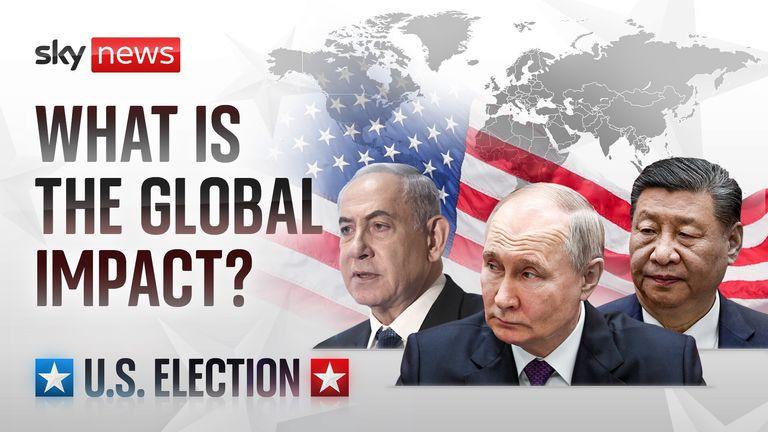In an increasingly interconnected world, the ripple effects of United States politics extend far beyond its borders, shaping global economies, security frameworks, and diplomatic relations. From trade policies to climate agreements, decisions made in Washington often carry profound implications for countries around the globe. This article explores why U.S. political developments command international attention and how they influence the geopolitical landscape, underscoring the enduring impact of American governance on the rest of the world.
US Foreign Policy Decisions and Global Economic Stability
US foreign policy decisions reverberate far beyond its borders due to the country’s unique role in the global economic system. As the largest economy with the world’s primary reserve currency, American fiscal and diplomatic moves can swiftly alter trade flows, investment patterns, and market confidence worldwide. For instance, sanctions imposed by the US on key nations or sectors often precipitate shifts in supply chains and commodity prices, directly impacting economies dependent on those markets. Equally, trade agreements and tariffs set by Washington set precedents, shaping international trade norms and alliances.
Several mechanisms illustrate this ripple effect:
- Currency Influence: The US dollar’s dominance in global reserves means policy decisions affect liquidity and borrowing costs internationally.
- Military Commitments: Strategic alliances and deployments influence regional stability, which in turn affects investor confidence and economic continuity.
- Regulatory Reach: American sanctions and export controls often compel multinational companies to alter operations globally.
| Policy Area | Global Economic Impact | Notable Example |
|---|---|---|
| Trade Tariffs | Disruption of global supply chains | US-China Trade War |
| Sanctions | Restricted access to finance and technology | Iran Sanctions |
| Monetary Policy | Global interest rate fluctuations | Federal Reserve rate hikes |
The Role of American Military Presence in Shaping International Security
American military bases scattered across continents serve as more than mere installations; they symbolize a vast network of strategic influence. These bases enable rapid deployment and foster operational partnerships with allied nations, helping maintain a delicate balance of power in volatile regions. Beyond force projection, the US military operates as a deterrent against aggression, often stabilizing fragile states and curbing the ambitions of hostile actors. This presence shapes global diplomatic dialogues, as nations recalibrate their foreign policies in alignment or opposition to American military posture.
Key impacts of the US military footprint include:
- Strengthening global alliances: Joint exercises and humanitarian missions boost trust and interoperability among allies.
- Securing maritime trade routes: Naval deployments protect essential shipping lanes vital for the global economy.
- Counterterrorism operations: Forward bases enable intelligence sharing and rapid responses to extremist threats.
- Influencing regional power dynamics: The military presence acts as a check against rising powers seeking to alter the status quo.
| Region | US Military Presence | Primary Security Role |
|---|---|---|
| Middle East | Over 30 bases | Counterterrorism & regional stability |
| Asia-Pacific | 50+ installations | Deterrence & alliance support |
| Europe | 20 bases | NATO commitments & deterrence |
How US Political Shifts Influence Global Climate Change Agreements
The United States plays a critical role in shaping global climate policy, often acting as a bellwether for international agreements. When US administrations pivot towards aggressive climate action, they inject momentum into global negotiations, encouraging other nations to commit to more ambitious targets. Conversely, political shifts toward skepticism or deregulation can stall progress, leaving international accords hanging in uncertainty. This is largely due to the US’s economic clout and its historical status as one of the largest carbon emitters, making its policies a direct influencer of global emissions trends and financing for climate initiatives.
Key mechanisms through which US politics influence global climate agreements include:
- Setting emission reduction targets that align or clash with global goals.
- Allocating funds for climate aid in developing countries, which is often pivotal in securing wider international cooperation.
- Participating in or withdrawing from multinational accords like the Paris Agreement, which sends diplomatic signals worldwide.
| US Political Phase | Impact on Global Climate Efforts | Example |
|---|---|---|
| Pro-Climate Action | Accelerates global commitments through leadership and finance | Rejoining Paris Agreement (2021) |
| Climate Skeptic | Undermines trust, delays agreements | Withdrawal from Paris Agreement (2017) |
Strategies for Other Nations to Navigate US Political Uncertainties
In the face of persistent political shifts in the US, other nations must adopt proactive diplomatic efforts to maintain stability and foster mutual understanding. This includes diversifying international partnerships beyond traditional allies, engaging in direct dialogue with multiple political factions, and building flexible trade agreements that can withstand sudden policy changes. By embracing a multifaceted approach, countries can better anticipate US political fluctuations rather than merely react to them.
Strategic resilience also hinges on enhancing domestic policy frameworks to absorb external disruptions. This involves:
- Strengthening economic self-sufficiency through innovation and diversified supply chains
- Investing in robust intelligence and risk assessment capabilities to monitor US political developments in real-time
- Promoting regional cooperation initiatives to create buffers against unilateral US decisions
| Strategy | Benefit |
|---|---|
| Diversified Trade Agreements | Reduced dependency on US markets |
| Strengthened Regional Alliances | Amplified geopolitical leverage |
| Real-Time Political Monitoring | Swift adaptation to policy shifts |
Future Outlook
As the United States continues to play a pivotal role on the global stage, its political decisions reverberate far beyond its borders. From economic policies to international alliances, the actions taken in Washington can influence markets, security, and diplomatic relations worldwide. Understanding the interconnectedness of US politics and global affairs remains essential for navigating the complexities of today’s international landscape. Vox.com will continue to monitor these developments, providing in-depth analysis on how American political dynamics shape the world’s future.




